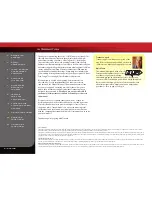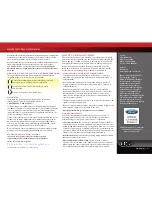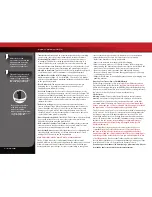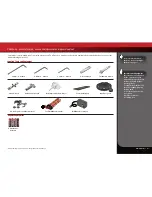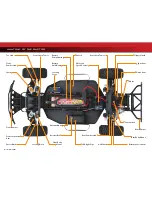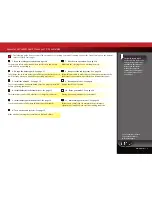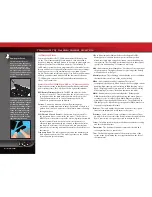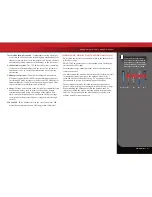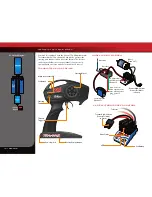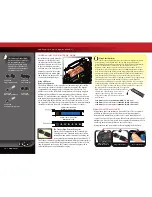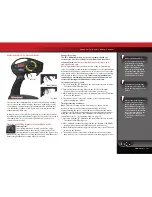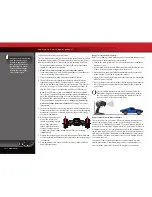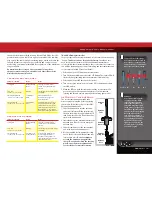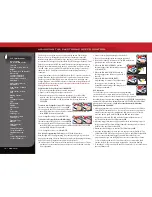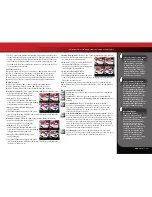
2 • RAPTOR
3
BEFORE YOU
PROCEED
3
SAFETY
PRECAUTIONS
5
TOOLS, SUPPLIES,
AND REQUIRED
EQUIPMENT
6
ANATOMY OF
THE RAPTOR
7
QUICK START:
GETTING UP
TO SPEED
8
TRAXXAS
TQ 2.4GHz
RADIO SYSTEM
16
ADJUSTING THE
ELECTRONIC SPEED
CONTROL
18
DRIVING YOUR MODEL
20
ADJUSTING
YOUR MODEL
22
MAINTAINING
YOUR MODEL
INTRODUCTION
Thank you for purchasing the Ford F-150 SVT Raptor by Traxxas. This
officially-licensed model captures the muscular looks and high-
performance driving experience of the full-size 411-horsepower
super-truck. Based on the award-winning Traxxas Slash, the Ford
Raptor model features waterproof electronics for all-weather off-road
adventure, rugged independent suspension with long-travel oil-filled
shocks, and a powerful Titan 550 motor that delivers 30+mph top
speeds. Rubber-sealed ball bearings, heavy-duty steel transmission
gears, and high-strength materials assure your Raptor model is “Built
Ford Tough
®
” for exciting R/C performance run after run.
We know you’re excited about getting your new model on
the road, but it’s very important that you take some time to
read through the Owner’s Manual. This manual contains all the
necessary set-up and operating procedures that allow you to
unlock the performance and potential that Traxxas engineers
designed into your model.
Even if you are an experienced R/C
enthusiast, it’s important to read and follow the procedures in
this manual.
We want you to feel confident that you own one of the best-
performing models in the market and that it is backed by a team
of professionals who aim to provide the highest level of factory
support possible. Traxxas models are about experiencing total
performance and satisfaction, not just with your model, but also
with the company that stands behind it. We truly want you to enjoy
your new model!
Thank you again for going with Traxxas.
Traxxas Support
Traxxas support is with you every step of the
way. Refer to the next page to find out how to
contact us and what your support options are.
Quick Start
This manual is designed with a Quick
Start path that outlines the necessary
procedures to get your model up
and running in the shortest time possible. If you are an
experienced R/C enthusiast, you will find it helpful and fast.
Be sure and read through the rest of the manual to learn
about important safety, maintenance, and adjustment
procedures. Turn to page 7 to begin.
FCC Compliance
This device contains a module that complies with the limits for a Class B digital device as described in part 15 of the FCC rules. Operation is subject to the following two conditions: (1) This device may not cause
harmful interference, and (2) this device must accept any interference received, including interference that may cause undesired operation.
The limits for a Class B digital device are designed to provide reasonable protection against harmful interference in residential settings. This product generates, uses and can radiate radio frequency energy, and, if
not operated in accordance with the instructions, may cause harmful interference to radio communications. The user is cautioned that changes or modifications not expressly approved by the party responsible for
compliance could void the user’s authority to operate the equipment.
Canada, Industry Canada (IC)
This Class B digital apparatus complies with Canadian ICES-003 and RSS-210. This device complies with Industry Canada license exempt RSS standard(s). Operation is subject to the following two conditions: This
device may not cause interference, and This device must accept any interference, including interference that may cause undesired operation of the device.
Radio Frequency (RF) Exposure Information
The radiated output power of the Traxxas LP Device is below the Industry Canada (IC) radio frequency exposure limits. The antenna for this transmitter must not be co-located with any other transmitters except in
accordance with FCC and Industry Canada multi-transmitter procedures. Co-location means having a separation distance of less than 20 cm between transmitting antennas.


